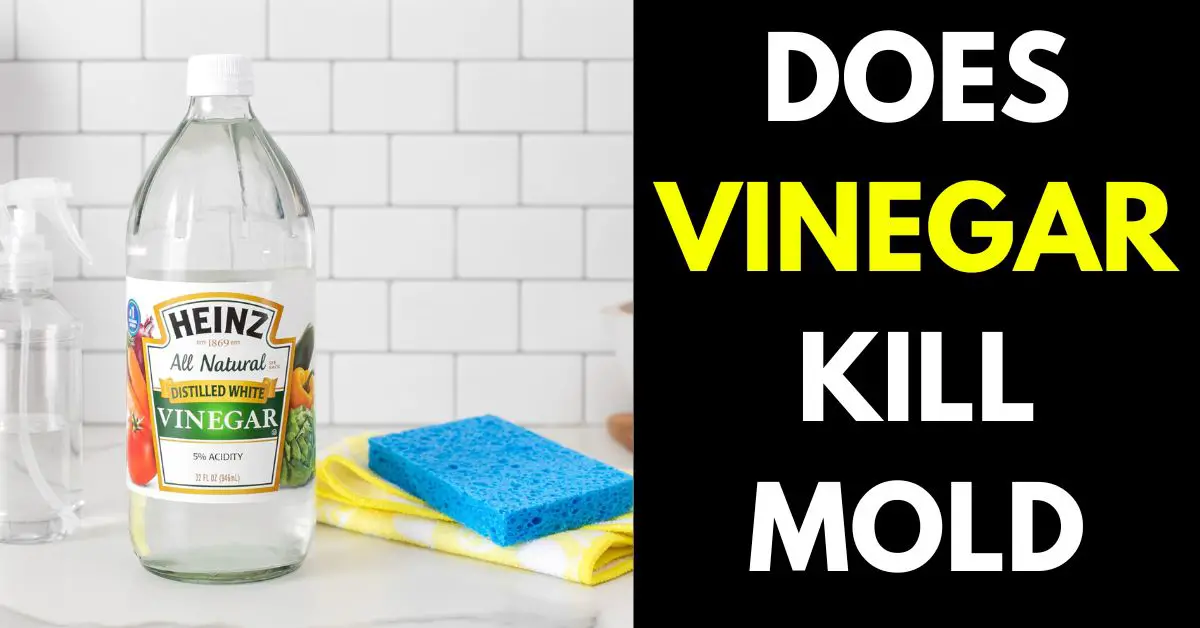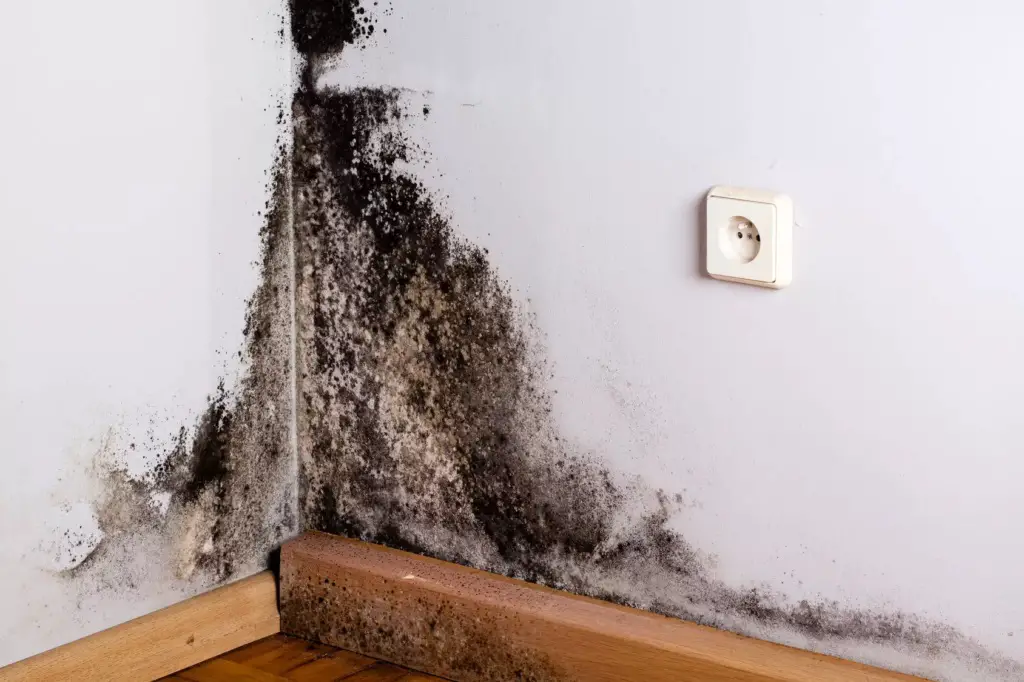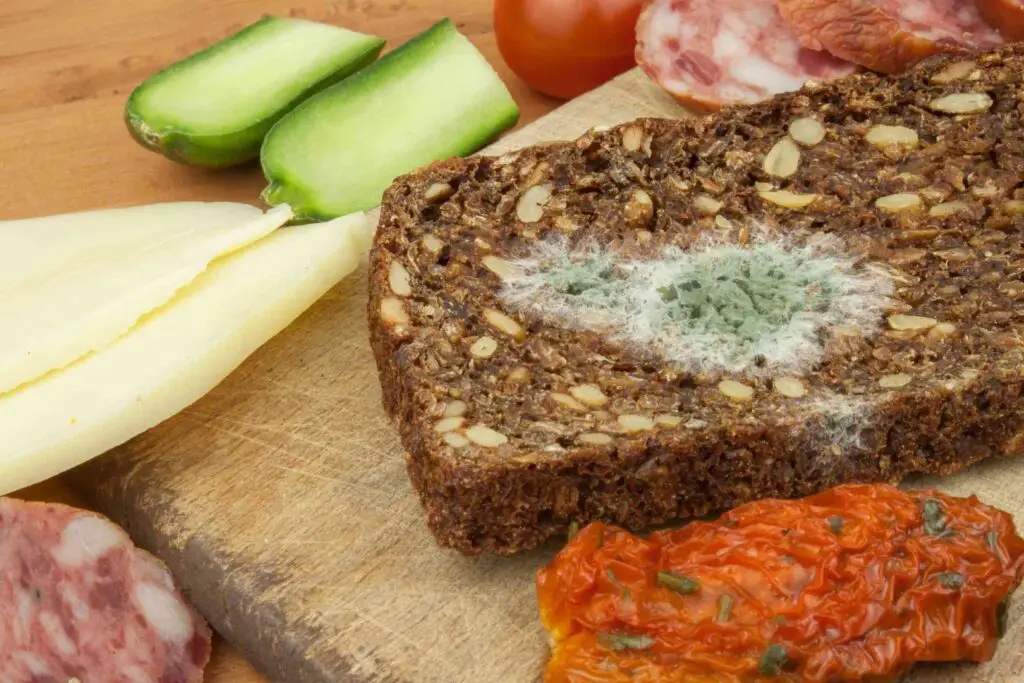
Mold is a fascinating organism that has many useful applications in the world of medicine and food. However, the mold that grows in your home can be a major problem. Not only does it look unsightly, but it can also trigger respiratory issues like asthma and allergies. If you have ever encountered mold in your home, you know how frustrating it can be to get rid of it. While professional restoration services are often necessary for severe cases, there is a household item that can be surprisingly effective against mold: white vinegar.
We will explore and provide tips from cleaning experts on how to use vinegar to eliminate mold and prevent it from coming back.
Does Vinegar Kill Mold
Vinegar has been a popular and effective household cleaner for centuries. It is an acidic solution that can be used for various purposes, including removing stains, eliminating bad odors, and even killing mold. But does vinegar really kill mold?

The short answer is yes, vinegar can kill many types of mold, including black mold, which is considered the most hazardous type. According to a study published in the Journal of Environmental Health, vinegar can eliminate more than 80% of mold species. It works by lowering the pH level of the mold’s environment, which makes it difficult for the mold to survive.
However, it’s worth noting that vinegar may not be effective against all types of mold. Some strains may require more potent cleaning solutions, and a significant mold infestation may require professional remediation. Additionally, vinegar should not be used on porous surfaces like drywall or fabric, as it can damage them.
Does Vinegar Kill Mold on Fabric
Yes, vinegar can be an effective natural remedy for killing mold on fabric. Vinegar has acidic properties that can break down and kill mold spores, making it a popular and affordable option for cleaning and disinfecting fabrics.
To use vinegar to kill mold on fabric, first, mix equal parts of white vinegar and water in a spray bottle. Then, spray the solution directly onto the affected fabric and allow it to sit for at least an hour. Afterward, wash the fabric with hot water and detergent in the washing machine, and let it air dry.
Does Vinegar Kill Mold in Carpet
Vinegar is a natural cleaning solution that is effective at killing mold and mildew on a variety of surfaces, including carpets. However, its effectiveness may depend on the severity of the mold infestation and the type of carpet fibers.
To use vinegar to kill mold on the carpet, you should mix equal parts white vinegar and water in a spray bottle. Then, spray the solution onto the affected area and let it sit for about an hour. Afterward, use a clean towel to blot up the excess moisture and then allow the carpet to air dry completely.
Does Vinegar Kill Mold on Food
While vinegar can be effective at killing mold on hard surfaces like walls and floors, it may not be the best option for dealing with mold on food. In fact, it’s generally not recommended to use vinegar to kill mold in food.

While vinegar is acidic, it may not be acidic enough to effectively kill all types of mold on food. Additionally, using vinegar to clean moldy food may alter the taste and texture of the food, making it unappetizing.
If you find mold on your food, it’s best to discard it rather than try to clean it with vinegar or other cleaning solutions. It’s also important to take steps to prevent mold growth in the future by storing food properly and checking for signs of mold regularly.
Does Vinegar Kill Mold on Wood
Yes, vinegar can be used to kill mold on wood. Vinegar has antifungal properties that can help kill mold, and it is a safer and more natural alternative to harsh chemicals like bleach.
Compared to bleach, vinegar can more easily penetrate porous materials like wood to kill mold growing underneath the surface. However, it may not be as effective in completely eradicating mold on wood, especially if the mold growth is severe or has penetrated deep into the wood.
What Kind of Vinegar Kills Mold
Most types of vinegar, including white vinegar and apple cider vinegar, have antimicrobial properties that can help kill mold. However, the effectiveness of vinegar in killing mold may depend on various factors such as the type of surface the mold is growing on, the severity of the mold growth, and the type of mold.
How Quickly Does Vinegar Kill Mold
The time it takes for vinegar to kill mold may vary depending on various factors such as the severity of the mold growth, the type of surface the mold is growing on, and the type of mold.
In some cases, vinegar may be able to kill mold in as little as an hour, while in other cases it may take several hours or even days to completely kill the mold.
Will Vinegar Kill Mold Permanently
While vinegar can be effective at killing mold, it may not necessarily kill mold permanently. If the conditions that allowed the mold to grow in the first place are not addressed, the mold may grow back even after it has been killed by vinegar. Address the underlying cause of mold growth and take steps to prevent it from coming back.
Can I Leave Vinegar on Mold Overnight
In most cases, it is safe to leave vinegar on mold overnight. However, the effectiveness of vinegar in killing mold may depend on various factors such as the type of surface the mold is growing on, the severity of the mold growth, and the type of mold.
Test the vinegar on a small area first to ensure that it does not cause any damage to the surface.
How Long Does It Take Vinegar to Kill Mold:
The time it takes for vinegar to kill mold may vary depending on various factors such as the severity of the mold growth, the type of surface the mold is growing on, and the type of mold.
In some cases, vinegar may be able to kill mold in as little as an hour, while in other cases it may take several hours or even days to completely kill the mold.

What Kills Mold Better Bleach or Vinegar:
Both bleach and vinegar can be effective at killing mold, but they have different pros and cons. Bleach is a stronger disinfectant and can kill a wider range of microorganisms, but it can also be harsh on some surfaces and can be dangerous if not used properly.
Vinegar is a more natural and gentle cleaning solution that may be safer to use on certain surfaces, but it may not be as effective at killing certain types of mold. The choice between bleach and vinegar may depend on various factors such as the severity of the mold growth, the type of surface the mold is growing on, and personal preference.
Does Vinegar Kill Mould on Walls
Yes, vinegar can be used to kill mold on walls, including drywall. Vinegar has antifungal properties that can help kill mold, and it is a natural and safe alternative to harsh chemicals.
To use vinegar to kill mold on walls, mix equal parts white vinegar and water in a spray bottle and spray the affected area. Let the solution sit for at least 15 minutes, then scrub the area with a soft-bristled brush or sponge. Be careful not to scrub too hard or use abrasive materials, as this can damage the drywall underneath.
After scrubbing, wipe the area clean with a damp cloth and allow it to air dry. Repeat the process if necessary, and ensure that the affected area is completely dry to prevent future mold growth.
Does Vinegar Kill Mold in Coffee Maker
Yes, vinegar can be used to kill mold in a coffee maker. To clean a coffee maker with vinegar, mix equal parts white vinegar and water and pour the solution into the coffee maker’s reservoir.
Run the coffee maker through a brewing cycle, then rinse the machine thoroughly with water to remove any leftover vinegar solution.
Does Vinegar Kill Mold on Concrete
Vinegar can also be used to kill mold on concrete. To clean mold on concrete, mix a solution of one part white vinegar and one part water in a spray bottle and spray the affected area.
Let the solution sit for at least 15 minutes, then scrub the area with a stiff-bristled brush. Rinse the area with water and repeat the process if necessary.
Does Vinegar Kill Mold on Clothes
Vinegar can also be used to kill mold on clothes. To do this, add a cup of white vinegar to the washing machine along with your regular laundry detergent and run the cycle as usual. For stubborn mold stains, pre-treat the affected area with vinegar before washing. However, be sure to check the care label on the clothing item to ensure it is safe to use vinegar and avoid using vinegar on delicate fabrics or fabrics that are prone to color fading.
Does Vinegar Kill Mold in Air Conditioner
Vinegar can be used to clean an air conditioner, but it may not necessarily kill mold. Mold growth in an air conditioner is often due to excess moisture, which can be caused by factors such as poor ventilation, clogged filters, or a malfunctioning unit.
While vinegar may help to clean the surface of the air conditioner and remove some mold, it may not address the root cause of the problem.
In addition, vinegar may not be effective at killing all types of mold, and it may not be able to penetrate deeply enough into the air conditioner to kill mold that is growing inside the unit.
Does Vinegar Kill Mold on Basement Walls
Vinegar may be effective at killing some types of mold on basement walls, but its effectiveness depends on the severity of the mold growth and the type of surface the mold is growing.
Vinegar may be more effective on non-porous surfaces like concrete or tiles, but it may not be as effective on porous surfaces like drywall or wallpaper. In addition, vinegar may not be able to penetrate deeply enough into the wall to kill mold that has grown inside the structure.
Does Vinegar Kill Mold on Drywall
Vinegar can be effective at killing mold on drywall, but its effectiveness may depend on the severity of the mold growth and the extent to which the mold has penetrated into the drywall.
Vinegar may be more effective at killing surface mold on drywall, but it may not be able to penetrate deeply enough to kill mold that has grown inside the drywall.
In addition, vinegar may not be able to completely remove the stains or discoloration caused by mold.
Does White Vinegar Kill Mold
White vinegar can be effective at killing some types of mold on certain surfaces. However, its effectiveness may depend on various factors such as the type of mold, the severity of the infestation, and the surface on which the mold is growing.
Does Apple Cider Vinegar Kill Mold
Apple cider vinegar has similar properties to white vinegar and can be used as a natural cleaning agent. It has some antimicrobial properties that can help kill mold. However, like with white vinegar, the effectiveness of apple cider vinegar in killing mold may depend on various factors such as the severity of the mold growth, the type of surface the mold is growing on, and the type of mold.
Does Distilled Vinegar Kill Mold
Distilled vinegar, like white vinegar, can be effective at killing mold on certain surfaces. The acetic acid in vinegar has some antimicrobial properties that can help kill mold. However, its effectiveness may depend on various factors such as the type of surface the mold is growing on, the severity of the mold growth, and the type of mold.
Does Dawn and Vinegar Kill Mold
Dawn dish soap and vinegar can be used together as a cleaning solution to help remove mold. Dish soap can help break down the mold, and vinegar can help kill it. However, like with vinegar alone, the effectiveness of this cleaning solution may depend on various factors such as the severity of the mold growth, the type of surface the mold is growing on, and the type of mold.
Does Baking Soda and Vinegar Kill Mold
Baking soda and vinegar can be used together as a natural cleaning solution to help remove mold. Baking soda can help absorb moisture and odors, while vinegar can help kill mold. However, like with other cleaning solutions, the effectiveness of this method may depend on various factors such as the severity of the mold growth, the type of surface the mold is growing on, and the type of mold.
Does White Vinegar Kill Mold on Wood
White vinegar can be effective at killing mold on wood, but its effectiveness may depend on various factors such as the severity of the mold growth and the type of wood. Prolonged exposure to vinegar can damage some types of wood, so it is important to use it carefully and sparingly on wood surfaces.
Does White Vinegar Kill Mold on Clothes
White vinegar can be effective at removing mold and mildew stains from clothes. Its acidic properties can help break down the mold and remove the stains. However, it may not be as effective at killing mold on clothes as it is on other surfaces.
Does Malt Vinegar Kill Mold
Malt vinegar, like other types of vinegar, can have some antimicrobial properties that may help kill mold. However, like with other types of vinegar, its effectiveness may depend on various factors such as the type of mold, the severity of the infestation, and the surface on which the mold is growing.
Does Vinegar Kill Mould on Walls
Vinegar can be effective at killing some types of mold on walls, but its effectiveness may depend on various factors such as the severity of the mold growth, the type of surface the mold is growing on, and the type of mold. Vinegar may be more effective on non-porous surfaces like tiles or glass, but it may not be as effective on porous surfaces like drywall or wallpaper.

Hi Everyone, BeYoungAholic’s aim is to help women who have lost their self-confidence because of the way they look. We will provide you tips and bits of advice on how to take care of yourself and maintain your youthful look. So, Enjoy the blog!
